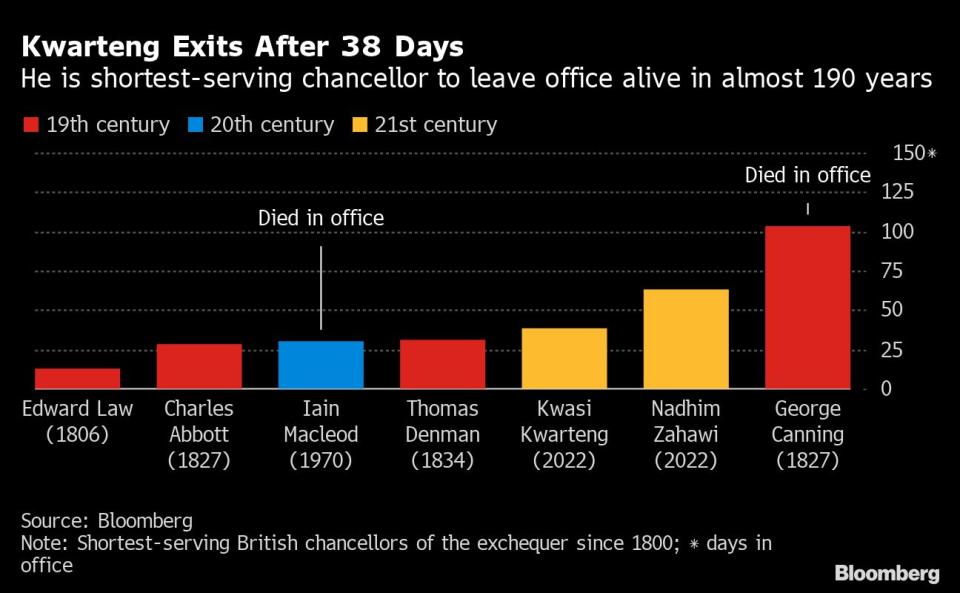Kwarteng Ousted as Truss Tries to Move Past Tax U-Turn Debacle
- Oops!Something went wrong.Please try again later.
- Oops!Something went wrong.Please try again later.
(Bloomberg) --
Most Read from Bloomberg
NATO-China Tension Over Ukraine Flares at Conference in Iceland
Secret Service Minimized Threats Before Jan. 6, Records Show
Stocks Drop in Asia, Dollar Dips Amid Wary Trading: Markets Wrap
Kwasi Kwarteng was thrown out as Chancellor of the Exchequer after just 38 days, but he spent more than a decade promoting his small-state, low-tax vision for the UK that proved his downfall -- and which may still cost Prime Minister Liz Truss her job as well.
Neighbors in southeast London and allies in book-writing before rising through government to the two most powerful positions in British politics, Truss on Friday jettisoned Kwarteng, 47, in a desperate bid to save her premiership.
Kwarteng’s Affinity With Truss May Win Him Keys to UK Coffers
As rumors of his ousting swirled, Kwarteng was traveling back early from the International Monetary Fund’s annual meetings in Washington having said earlier in the week he was “absolutely 100% not going anywhere.” He was back on British soil by the time the ax officially fell in a meeting with Truss.
“You have asked me to stand aside as your Chancellor. I have accepted,” Kwarteng wrote in a letter to Truss, adding “I believe your vision is the right one.”
Things started to go wrong for both Truss and Kwarteng almost as soon as they got started on their economic project. Though the prime minister had spent the summer talking up her low-tax aspirations, the scale of the £45 billion in cuts Kwarteng announced on Sept. 23 still took markets by surprise.
It was as though having waiting so long for their chance, Kwarteng and Truss couldn’t resist starting with a bang: the largest package of unfunded tax cuts in more than five decades. And details of how the stimulus would be covered wasn’t scheduled until November.
Critics piled in from all sides, accusing Kwarteng of disregarding nervousness that was already spreading through global markets and the Bank of England’s struggle to control the fastest inflation since the 1980s.
The pound slumped to a record low against the dollar in the aftermath, and the central bank was forced to come to the rescue to prevent turmoil in UK markets from spreading as gilt years surged and pension funds buckled.
Conservative members of Parliament watched as a series of polls showed the ruling party increasingly trailing the Labour opposition, signaling a wipeout at the next election. Voters have become alarmed with what’s become known as “the Kwarteng premium,” a surge in mortgage borrowing costs linked to the rise in yields on government bonds.
Some of Truss’s Top Team Say Her Project May Already Be Over
In her response to Kwarteng, there was no hint that any divisions between the two had opened up. “We share the same vision for our country and the same firm conviction to go for growth,” the premier wrote.
Even some Truss allies suggest her economic project is dead. Kwarteng already had backtracked on plans to cut taxes for the best-paid workers, which jarred with long-standing policies to “level up” less wealthy parts of the country.
Kwarteng’s departure leaves the Truss government in disarray, shorn of the key policies that won her the contest to replace Boris Johnson as Conservative leader and prime minister. Truss beat former Chancellor of the Exchequer Rishi Sunak with a series of promises to cut taxes, despite Sunak’s warnings that her policies would cause mayhem in markets.
Broken Dream
Getting rid of the chancellor who set out the detail of that program gives Truss the opportunity to reset both her economic program and her premiership. She has already begun doing so by naming Jeremy Hunt -- a former foreign secretary, onetime leadership hopeful and a backer of Sunak -- as Kwarteng’s successor.
But it will be difficult for her to avoid taking some of the blame, since both Truss and Kwarteng presented themselves as a political double act, moving in lockstep with their plans for the economy.
Can Liz Truss Survive If Her UK Economic Project Is Over?: Q&A
Conservative members of Parliament have grumbled that Truss’s leadership is pointless if the prime minister is divorced from the economic program she campaigned on over the summer.
With the next general election due by January 2025 at the latest, the Tories face a choice of keeping Truss in power while fronting policies voters know she doesn’t believe in, or cutting their losses and changing leader.
For Kwarteng, it’s a humiliating end brought about, ironically, by the market forces he and Truss argued should be unleashed in their 2012 book “Britannia Unchained.” He and Truss were born in 1975 and grew up under Margaret Thatcher’s government. They have fallen far short in their bid to emulate her.
(Updates with Truss letter in 10th paragraph. An earlier version of this story was corrected to show they are southeast London neighbors)
Most Read from Bloomberg Businessweek
A Digital Drive to Reform the $11 Trillion Global Gold Market
Exxon’s Exodus: Employees Have Finally Had Enough of Its Toxic Culture
©2022 Bloomberg L.P.



